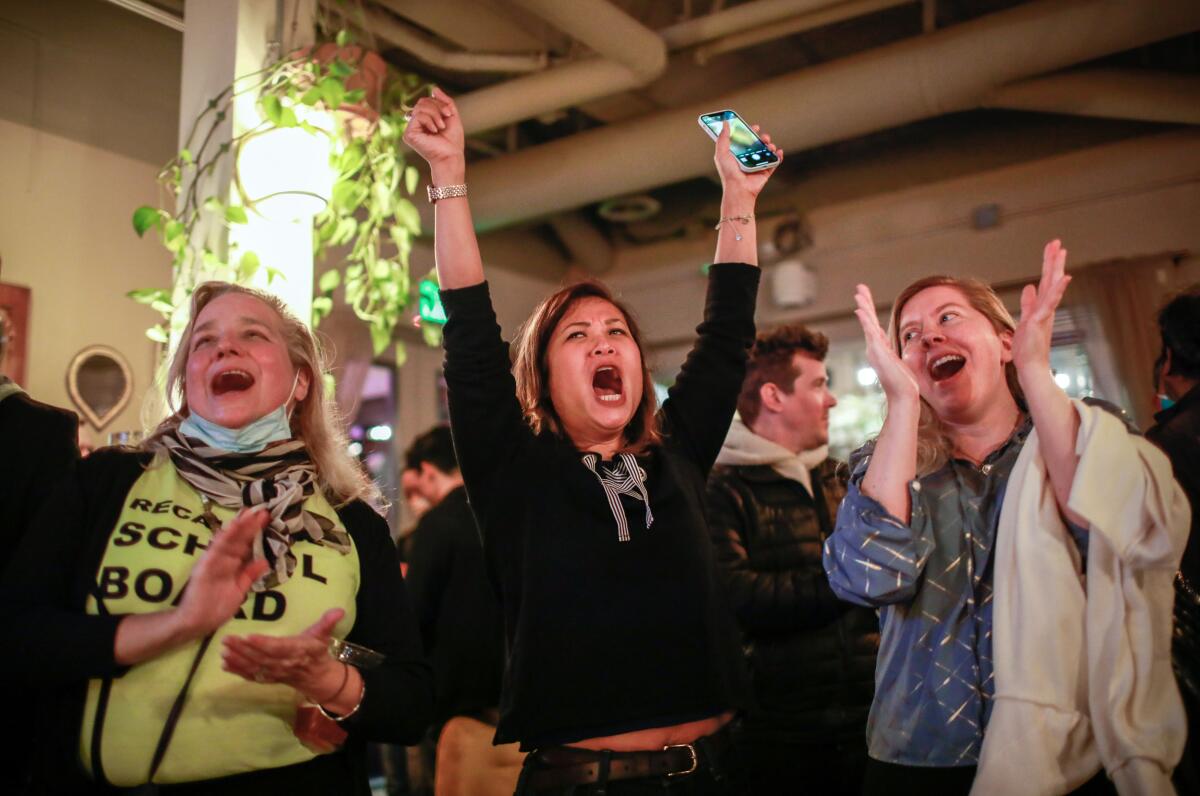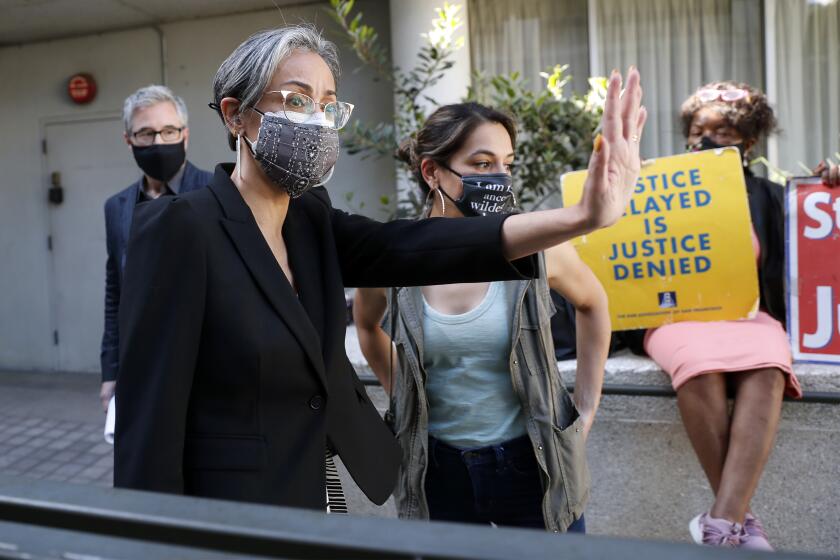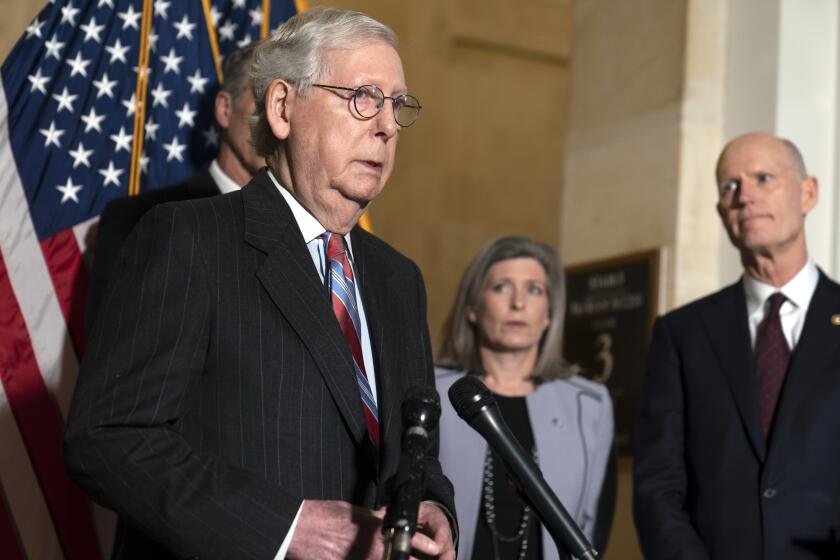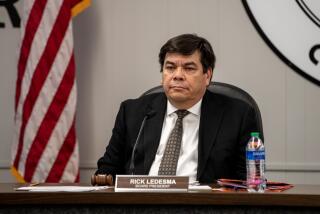San Francisco is usually seen as a lefty outlier. The school board recalls may make it a bellwether

- Share via
San Francisco is so famous for its liberalism that the city has become shorthand for eccentric political sensibilities far to the left of most Americans. But after Tuesday’s trio of school board recalls, Democrats and Republicans alike see the city not as an outlier, but as a potential bellwether.
Residents voted overwhelmingly to unseat the three members for a litany of perceived offenses. Many were unique to the city, including an ill-considered effort to rename dozens of schools during the height of the pandemic and fiscal irresponsibility. But it was the foremost complaint of parents — the protracted school closures — that resonates far outside San Francisco and underscores Democrats’ precariousness as they head into the midterm elections.
The vote coincides with other signs of resistance to progressive orthodoxy: The Democratic mayor recently called for more funding to police crime-ridden neighborhoods, and another recall effort — against the city’s reformist district attorney — has qualified for the ballot. And while it’s difficult to draw conclusions from a single election, Democrats in California and across the nation described the recall as a cautionary tale that voters view their party as insufficiently responsive to core concerns like education and safety.
“It’s yet another indication of what we’re seeing in terms of headwinds Democrats are going to have to deal with,” said Lanae Erickson, senior vice president for social policy, education and politics at Third Way, a centrist Democratic group.
“Democratic policymakers are lagging behind even our own voters,” she said, pointing to the results of the New York City mayor’s race, where Eric Adams won on a message of more money for police, not less. “If a place as blue and liberal as San Francisco is saying ‘enough is enough,’ we know that it’s got to be true in swing states across the country.”
The ouster of San Francisco school board members over COVID-19 issues bodes poorly for Democrats come November.
Some say the school board removals are not a reflection of the national political climate. They noted other local factors, including controversial changes to admissions at the city’s top public high school, which angered and galvanized Asian American voters, and offensive tweets by one recalled member that resurfaced.
“It was about a series of incompetent decisions that were not well handled, and they built one upon the other,” said Jason McDaniel, an associate professor of political science at San Francisco State University. “It’s about the competence and quality of the governance” — not a sweeping rejection of progressive politics.
More than 70% of voters supported ousting school board members Alison Collins, Gabriela López and Faauuga Moliga. For perspective, 86% of the city’s voters chose to retain Gov. Gavin Newsom in last year’s gubernatorial recall election, more than 20 points higher than the statewide vote.
The breadth of support for this week’s recall created some unlikely political allies.
Substitute teacher Kevin Robinson, 50, described himself as a registered Democrat who leans at times toward the Green Party. Yet he found himself “nodding along in agreement with staunch Republicans, people on Fox, right-wing news groups,” he said with bemusement.
“We were the biggest district in the country that was the last to open up schools,” said the North Beach resident. “We became a laughingstock of the world. How could this happen? San Francisco [is seen as] being the bastion of liberalism and forward thinking, but yet we can’t figure out how to open schools up?”
Robinson, who is Black, also bristled at the notion that the recall was driven by “affluent white mothers.”
“These kinds of grass-roots movements are fueled by a lot of folks: gay, straight, Black, Asian, Latino, white,” said the father of a second-grader.
“This sends a message that you have woken up parents and caregivers, who said, ‘Enough is enough. We are going to do something about this,’” Robinson said. “People who remain in positions of power and influence are on notice. Do what’s best for kids or you could be next.”
Amanda Fried, a 40-year-old registered Democrat who does policy work for the city, struggled with what her support for the recall meant for her political identity.
“My values are so strongly aligned with the Democratic Party. I don’t know where to go. I’m never going to step away from being pro-choice, pro-immigrant — the core tenets. But yet I feel the party of science and the party of families has just completely let us down,” said the Bernal Heights resident.
She could not make sense of the juxtaposition of tens of thousands of mask-less people at the Super Bowl in Inglewood on Sunday, and then sending her vaccinated 12- and 8-year-old children who have recovered from COVID to school the next day wearing masks.
“I’m really scared for the political implications if this is how I’m feeling in San Francisco,” Fried said, adding that the risk to Democrats could be even more acute in swing states like Pennsylvania, where she’s from. “There’s going to be hell to pay for this.”
Some Democratic strategists argued that the party can turn the recall into a favorable message by saying that it demonstrates the party’s willingness to reject extremism in its ranks.
Sean Clegg, a Democratic advisor to billionaire developer and former Republican Rick Caruso’s campaign to become Los Angeles’ next mayor, said the ouster of the school board members creates a contrast with the GOP’s handling of last year’s Jan. 6 violence and insurrection at the U.S. Capitol.
“What did Republicans do? They sanctioned insurrection,” said Clegg, who lived in the city for much of the last three decades.
The vote “shows that rank-and-file Democratic voters in big cities aren’t ideologues. They want results,” he said.
GOP divisions continue over the RNC censure of Reps. Liz Cheney and Adam Kinzinger with a resolution that seems to minimize the Jan. 6 Capitol attack.
While some political observers saw parallels with other raucous school board fights across the country over masking policies and curricula, state Sen. Scott Wiener (D-San Francisco) cautioned against drawing broad conclusions, noting the city has embraced vaccine mandates and ethnic studies in schools.
“This grew out of frustration that the school board was not moving fast enough to reopen the schools,” he said. “That was a frustration in San Francisco as it was elsewhere, but that’s where the similarity ends.” He added that supporting the schools recall (which he did) doesn’t necessarily translate to supporting the one against Chesa Boudin, the progressive district attorney (which he does not).
Still, he acknowledged that San Franciscans are rightfully frustrated with issues such as crime and homelessness, and that Democrats run the risk of appearing they aren’t responsive enough to voters’ priorities.
“It’s not a fair perception, but that narrative does exist,” said Wiener, who is widely expected to run for House Speaker Nancy Pelosi’s congressional seat once the fellow San Francisco Democrat retires. “Democrats have to do a better job making sure people understand what Democrats are doing,” citing the wide distribution of vaccines and funding for public education via COVID-19 relief.
Republicans such as House Minority Leader Kevin McCarthy of Bakersfield pointed to the school board recall as a repudiation of Democratic policy, arguing that the landslide vote was proof of the rival party’s overreach.
“Parents are standing up to have their voices heard,” he said. “School boards have used ‘equity’ and ‘social justice’ as an excuse to discriminate and lower standards for children.”
Harmeet Dhillon, one of California’s three members of the Republican National Committee, said her experience living in the city since 2003 illustrates the woes facing residents of all political persuasions. Until two years ago, she walked to work every day from her home in the Russian Hill neighborhood to her law firm’s office near Union Square.
“The whole point of San Francisco is you put up with all the nonsense because it’s a pseudo-European city with safe streets to walk around, interesting restaurants. We don’t have that anymore,” she said.
And she scoffed at the anti-recall campaign’s argument that the effort was spearheaded by wealthy conservatives. “There aren’t enough billionaires or right-wing voters in the city to elect a dog catcher,” Dhillon said.
Julie Roberts-Phung, a co-chair of the No School Board Recall campaign and a parent, said she was troubled to see a small electorate turnout overturn the voters who put the school board members into office — a similar argument to the one used by opponents of the Newsom recall such as Clegg.
The longtime activist in the school community said she found it “really infuriating to see outside billionaires” fund the recall effort.
At least one prominent billionaire cheered the results Wednesday on Twitter: Michael R. Bloomberg, the former New York City mayor and 2020 presidential candidate. Bloomberg did not put money into the effort. But he has backed charter schools and other education reforms often opposed by teachers unions. His senior advisor, Howard Wolfson, said he believes the election shows Democrats are at a tipping point, particularly on the issue of schools.
“Parents are really fed up, even in really big, blue progressive strongholds,” Wolfson said. “They have had enough of schools that are not serving the needs of their kids.”
More to Read
Get the L.A. Times Politics newsletter
Deeply reported insights into legislation, politics and policy from Sacramento, Washington and beyond. In your inbox three times per week.
You may occasionally receive promotional content from the Los Angeles Times.















